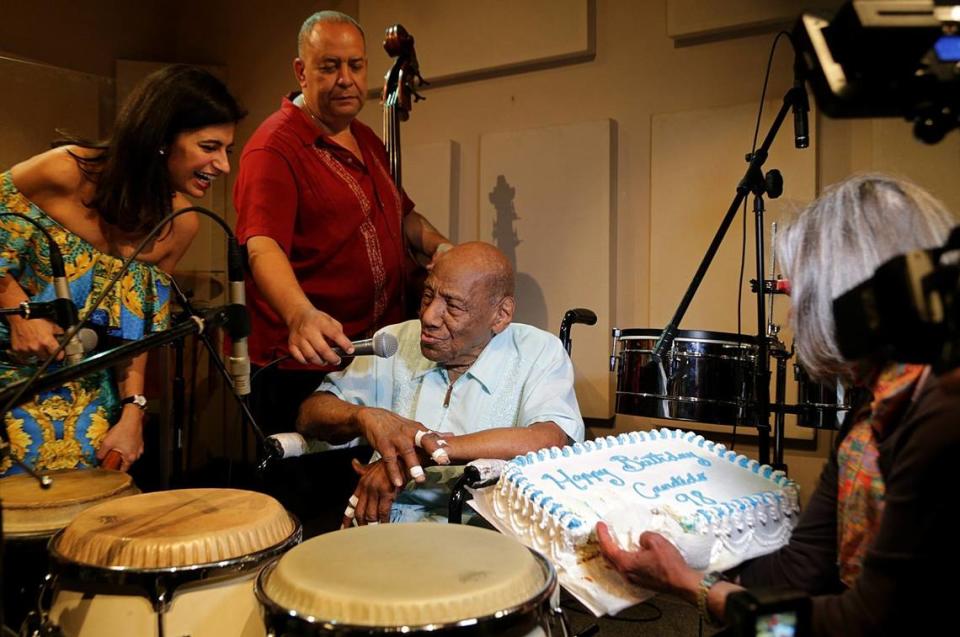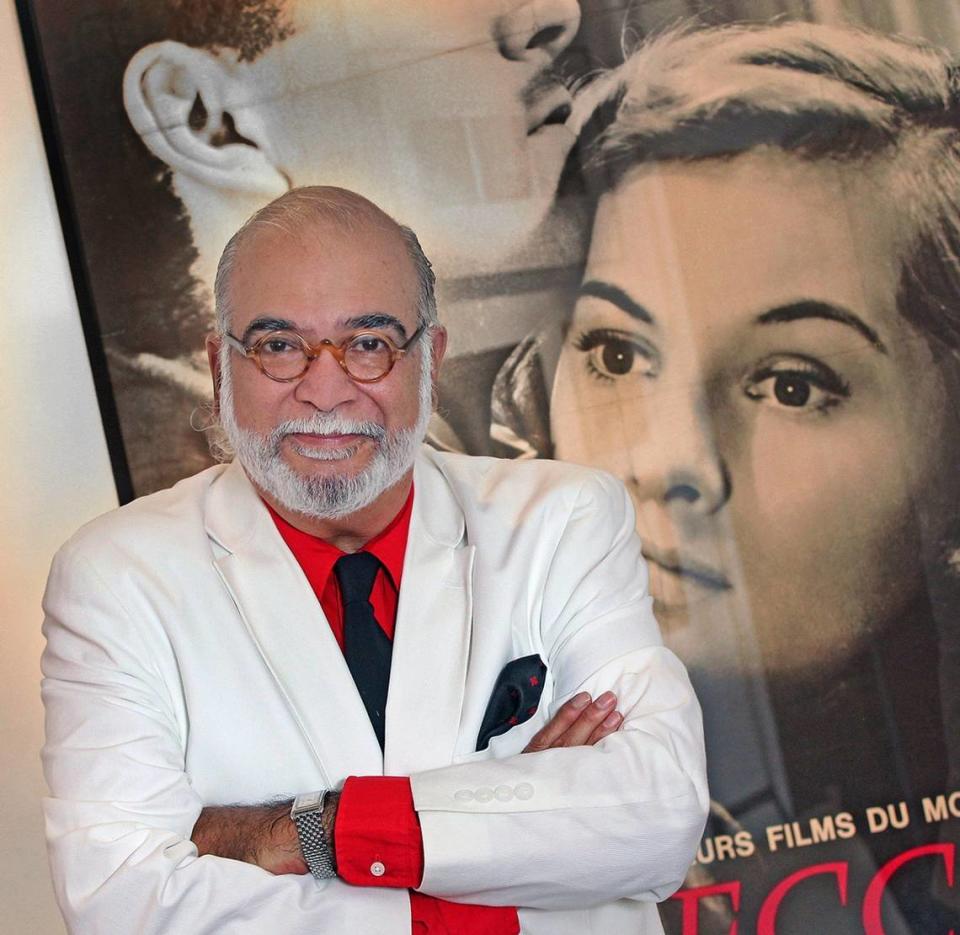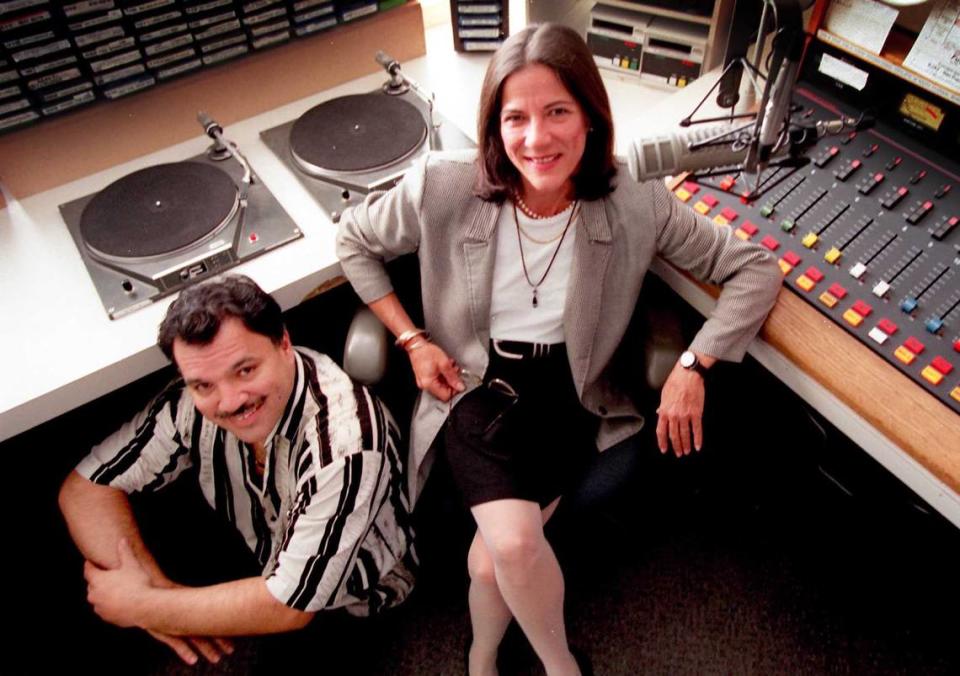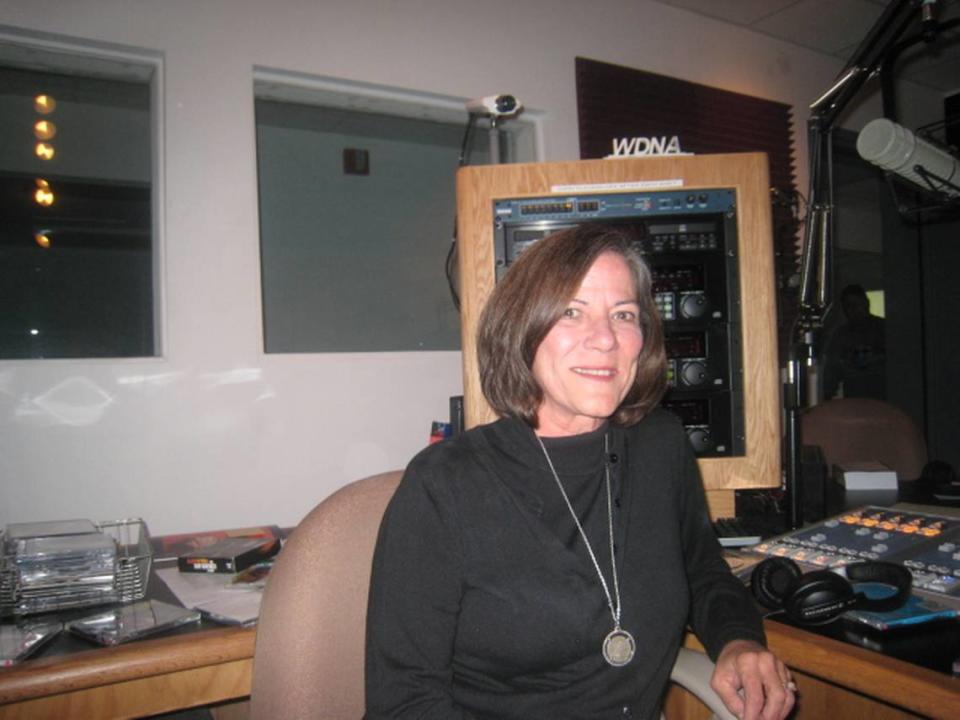Maggie Pelleyá went on the radio, and it changed Miami. Fans are mourning WDNA manager
Maggie Pelleyá’s more than 40 years guiding Miami community radio station WDNA couldn’t have had a more inauspicious start.
When Pelleyá, the station’s general manager since 1994, started with WDNA as a volunteer in the early 1980s, its studios were housed inside a weather-worn semi-truck trailer that squatted in a lime grove in South Miami-Dade farmland.
“Bargain basement radio,” WDNA’s then-president told the Miami Herald in 1983 while on the air as he shooed ants off the mixing board that foraged for crumbs in the shag carpeting. He, too, foraged but for a vinyl jazz LP to slap on the turntable to broadcast. Most of the “really good records” had been pilfered by WDNA’s DJs at the time, he said, and none of the DJs had showed up to work that day.
“Good afternoon. You’re listening to WDNA, community radio. I’m Tom, sitting in for whoever’s supposed to be here, and isn’t,” he announced to whoever was listening 40 years ago.
But Pelleyá found a devoted audience, stamping WDNA 88.9 FM, now settled into a studio building in the 2900 block of banyan tree-lined Coral Way, the station slogan “Serious Jazz Miami” — a testament to her leadership.
“Lots of folks have contributed and been instrumental at WDNA throughout the years, but truly Maggie Pelleyá is the reason we all have a place to be called WDNA,” the station posted on its website this week in tribute.
Pelleyá died suddenly on Tuesday, May 9, at 72, the station and her family said. A cause has not been given.
Pelleyá as educator

“She taught us to be insatiably curious, deeply patient, and encouraged us to explore this wondrous world,” her son Wifredo Fernández told the Miami Herald on Friday.
“She taught us the importance of participating in democracy because she witnessed its antithesis, of defending the voice of the individual, of the complexity of creative expression, of the beauty and joy of experiencing art in all its forms, of preserving nature, the power of positive thinking, and the simple pleasures that life offers. She was a modern renaissance woman, cross-generational, and just so damn cool,” Fernández said.
When Nat Chediak, founder of the Miami Film Festival, gravitated to producing Latin jazz records where he’d score three Grammy awards and three Latin Grammys starting in 2002 for his work on albums by Bebo Valdés and Chucho Valdés, he turned to his dear old friend and her audience of jazz devotees at WDNA.
Chediak met Pelleyá when he ran the independent Cinematheque theater in Coral Gables in the 1970s. Pelleyá was working reservations for Delta Airlines at the time, predating both WDNA and the Miami Film Festival.
“Maggie’s easygoing demeanor belied a steely resolve to find a home in South Florida airwaves for ‘America’s classical music,’ which is what jazz meant to her and means to her listeners,” Chediak said.
“For decades, she struggled out of a second-story walk-up near Westchester to find a proper location and increased frequency for WDNA, which she accomplished when the station moved to its present headquarters in Coral Way,” Chediak said.

Cultural exposure
Her 23 years at Delta, which ended after the birth of her second son, Diego, and after WDNA managers promoted her from volunteer to her management position in 1994, provided training ground for the Havana-born Pelleyá.
Born May 14, 1950, Pelleyá came to Miami at age 10 in December 1960. She lived with family friends until her mother, Margarita Madrazo, could join her in 1961. Her father, Jose Luis Pelleyá, a lawyer who owned Union Radio Cadena Nacional in Cuba, had exposed his eager 6- and 7-year-old daughter to the possibilities of a DJ booth and broadcasting. He was politically imprisoned on the island until he arrived in Miami in 1970.
By then Pelleyá was 20 and soon to embark on a career with Delta in October 1972.
“That helped me to travel a lot. Traveling opens your horizons in an incredible way, and that has helped me to learn to appreciate the richness of all the cultures that surround me,” Pelleyá told el Nuevo Herald in a 1995 interview.
As Pelleyá and her husband, Luis Wifredo Fernández, who had studied broadcasting at Miami Dade College, volunteered and together produced a music program, “Para Ustedes,” at WDNA, for a couple of years, she eventually advanced to station general manager.
At WDNA, she continued to absorb advice about radio from her father who had reestablished his law career in the States. Pelleyá ensured those cultural voices she had heard on her travels — a mélange of English, Spanish, French, Creole, Urdu and other languages — would be heard and celebrated through jazz and world music on the station for its South Florida listeners.
“Being at the head of a radio station is a huge responsibility because you are the one who holds the reins and the successes and failures will fall on your shoulders,” Pelleyá told el Nuevo Herald, noting how community radio is not simply successful due to a manager’s musical tastes. One must also have the ability to encourage and tap state and federal funding so as to stay on the air.
“Public radio differs from commercial radio in that it is an educational medium,” Pelleyá once said. “Our purpose is to keep alive the cultures that coexist in Miami that are not represented in other stations, to highlight their richness, so that they are not lost.”
WDNA’s support for the arts
READ MORE: After years of struggle, jazz music in Miami has hit a tipping point

Chediak, and listeners who are mourning her through social media posts, understand the challenge.
“There are a small number of individuals — like Michael Tilson Thomas and Edward Villella — who raised the bar for the arts in our community. Unlike them, Maggie was not an artist. But working with an army of volunteers and educational institutions like the Frost School of Music [at the University of Miami] she made it possible for musicians to prosper and grow, both in the WDNA studio and in the city at large. The arts are in mourning. We shall not see the likes of Maggie anytime soon. I will miss her forever,” Chediak said.
“I got to know Maggie well in in 2003 when I started my band PALO!,” said Miami Dade College music professor Steve Roitstein. He leads the Miami Afro-Cuban funk band.
“She facilitated us with her graceful generosity in that initial period and ensured that WDNA supported my project throughout the years. With open arms, Maggie welcomed my Miami Dade College music business students as interns at the station, offering excellent learning opportunities to a diverse group of young people,” Roitstein said.
“She never sought the spotlight, instead nurturing and highlighting those who were lucky enough to be around her. But her kindness, intelligence, and perpetual efforts for the causes she believed in delivered tangible and lasting results to the arts world internationally. Our community benefited immeasurably from her guidance of WDNA, a legacy that will outlast all of us,” Roitstein said.
Around 2008, WDNA started presenting jazz concerts in its gallery and performance space at the Coral Way property. The station’s monthly Jazz Encounters events gave middle and high school students the opportunity to jam with professionals.
“We used to think jazz was strictly for gray-haired folks,” an enthusiastic Pelleyá told the Herald in 2014. “But there are 20-somethings and even teenagers. It’s definitely grown, overall.”
The Jazz Encounters event scheduled for 8 p.m. Friday, May 12, at WDNA’s studio at 2921 Coral Way, was designed as a tribute to Pelleyá, featuring Australian jazz guitarist Tim Jago and his group.
Survivors and services

Pelleyá’s survivors include her husband of 45 years Luis Wifredo Fernández, sons Wifredo “Wifi” Fernández and Diego Fernández, and sister Maria “Mimi” Pelleyá. She was predeceased by her parents and her brother Jose Luis Pelleyá.
A Mass will be held at 10 a.m. Wednesday, May 24, at St. Augustine Catholic Church, 1400 Miller Rd., Coral Gables.
The family requests that donations in Pelleyá’s honor can be made via WDNA.org.


